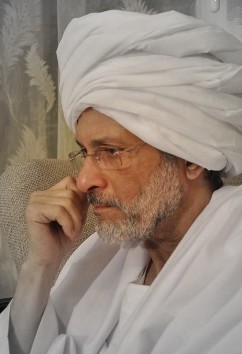Sudan’s ex-majority leader becomes NCP’s first high-profile defector in a decade
October 26, 2013 (KHARTOUM) – The former adviser to president Omer Hassan Al-Bashir and the ruling National Congress Party (NCP) ex-majority leader in parliament Ghazi Salah Al-Deen Al-Attabani declared today his intention to leave the party and form a new one that would “bring new hope to Sudan”.

The punished members were among a larger group that included more than 30 NCP figures which signed on an open petition to president Bashir last month following the government’s decision to cut fuel subsidies which prompted a deadly wave of protests across the country that killed at least 60 according to official figures and more than 200 as reported by activists and rights groups.
The signatories including lawmakers and retired army officers, called for reinstating the subsidies due to its “harsh” impact on ordinary Sudanese and demanded that the government prosecute those behind the use excessive violence against protestors.
They also urged Bashir to form a mechanism for national reconciliation comprised of various political forces and assign the economic dossier to a professional national economic team.
“The legitimacy of your rule has never been at stake like it is today” they said in their letter to Bashir which was seen as a direct challenge to the president who is now the country’s longest serving leader.
Al-Attabani and several others also refused to appear before the panel and questioned its legality and standing. They also said its formation shows the lack of tolerance inside the party for different views.
On Saturday he described the committee’s recommendations as “arbitrary” and said that those behind it “have fired the death bullet on the body of reform which they claim to be seeking”.
He pointed that the door is now wide open for the formation of a new political party, adding that they laid out a formula for a party that would offer a respected alternative and bring new hope to Sudan.
Al-Attabani said that they will consult with large segments of the Sudanese people to arrive at a consensus that accommodates their hopes and aspirations.
One of the three dismissed members by the name of Fadlallah Ahmed Abdallah said today that they will name the new party within a week adding that a mini-committee was formed to pick a name.
The former presidential adviser has long shown to be unhappy with the direction of the country and the NCP though he has been very careful not to make public statements that would make him appear to align with opposition’s agenda.
This has led many reformists in the NCP and its ideological arm, the Islamist Movement (IM) to criticize Al-Attabani saying that he is unwilling to take a firm and unequivocal stance against the government in his push for change and is only talking of reform in very general terms.
But Attabani was slowly becoming at odds with the NCP old guards and was removed earlier this year from his post as NCP majority leader in the national assembly which was widely believed to be in response to his assertions that Bashir is constitutionally barred from running again for presidency.
Last year he withdrew his candidacy for IM Secretary General and left its convention angrily due to what he saw as interferences by influential government figures who pushed through amendments he strongly opposed.
In July he released a memo outlining what he said is his vision for “reformist drive” emphasizing that he is keen on reform to shield the country and people from more problems. He also warned that resistance to reform might makes matters worst in Sudan.
It remains to be seen whether al-Attabani’s decision to leave the NCP will shake up the political scene and whether it might lead to more defections and emergence of new political alliances with other opposition parties.
The first split within the NCP took place in 1999 following a bitter power struggle between Bashir and Islamist leader Hassan Al-Turabi, with the latter subsequently ousted from his post as parliament speaker.
Al-Turabi later established the Popular Congress Party (PCP) and has since been a vociferous critic of the very regime for which he orchestrated the army-backed seizure of power in 1989.
The NCP has been facing growing difficulties particularly as its coffers dried up after the oil-rich south became an independent nation in July 2011.
Last November the Sudanese government said that it uncovered a “sabotage” attempt that was later upgraded and labeled as a coup. Authorities arrested dozens of suspects in the army and security apparatus including ex-spy chief Salah Gosh and Brigadier General Mohamed Ibrahim Abdel-Galil who served in Bashir’s security detail at one point.
(ST)
